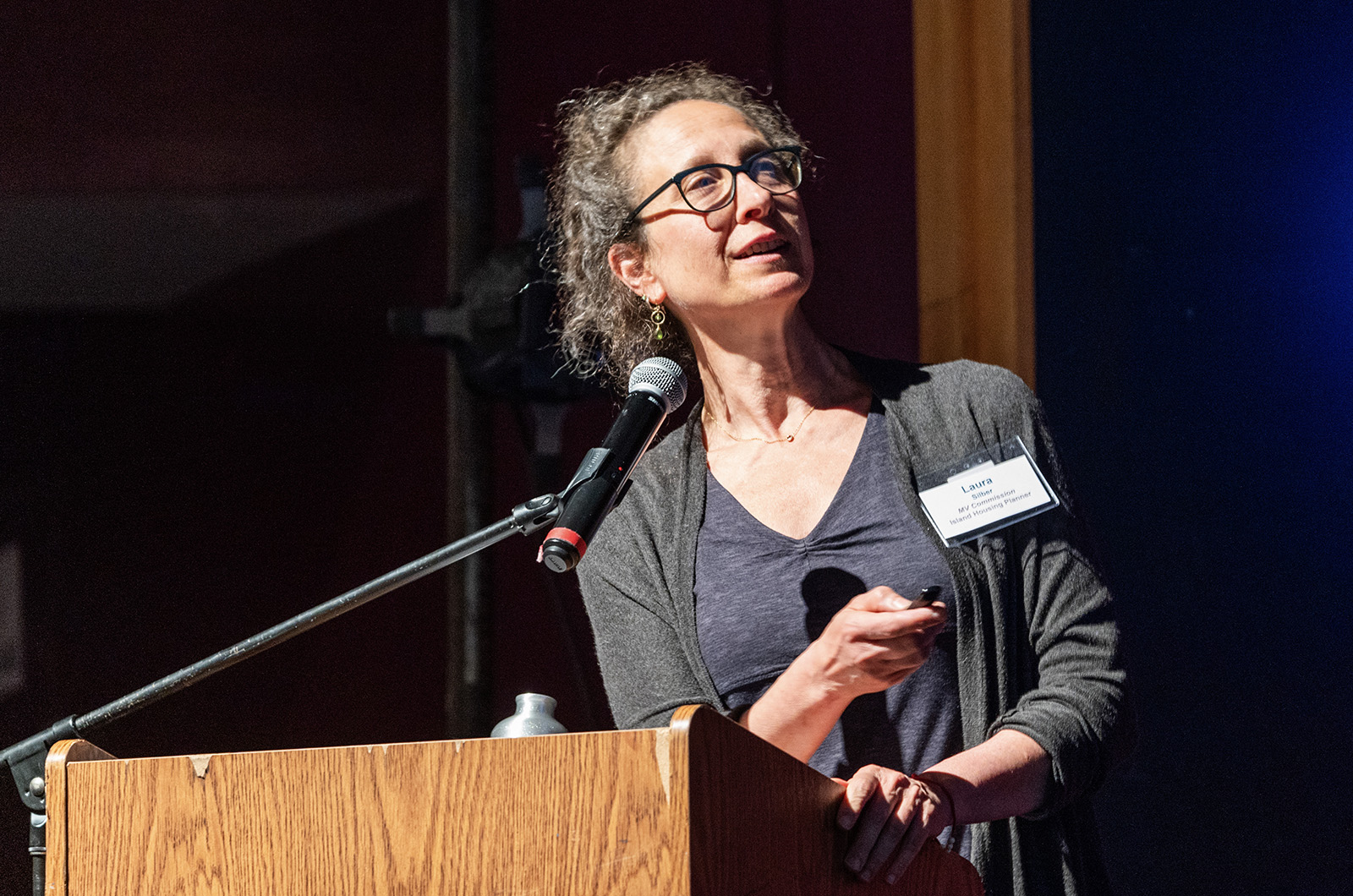The Martha’s Vineyard Commission debuted a new report on the affordable housing crisis Tuesday afternoon, during a visit by Massachusetts state Secretary of Housing Ed Augustus to the Island.
The report, titled the State of Housing on Martha’s Vineyard, showed the daunting prospect of trying to attain housing on the Island.
As of 2023, an affordable house for the average Island family — costing less than 30 per cent of annual income in mortgage, taxes, and insurance — should cost $400,000. But the median single-family home on the Vineyard, as of this year, costs just over $1.3 million.
Adam Turner, head of the Martha’s Vineyard Commission, told Mr. Augustus and assembled community members at the Performing Arts Center Tuesday that housing on the Island has fallen “out of balance.”
“It used to be in balance. It used to be for people that lived here — now it’s tilted to money in the seasonal workforce,” Mr. Turner said. “There isn’t any rental market” for year-round Islanders, he stressed.
Laura Silber, Island housing planner for the commission, presented the commission’s findings in detail.
In 2012, the median home price on Martha’s Vineyard, including multi-family and condo units stood at $600,000, Ms. Silber said. By 2023, that number had more than doubled.
Ms. Silber said that rising home prices have contributed to a hollowing out of the Island’s middle and working classes.
According to the commission’s report, 40 per cent of Dukes County residents made less than $50,000 per year in 2012, and 27 per cent of residents made more than $100,000. In 2022, 23 per cent of the Island’s residents made less thann $50,000 and 40 per cent made over $100,000. But despite what could look like good news as incomes have increased, the numbers do not tell the whole story, Ms. Silber said, as many with lower incomes have had to leave the Island.
“People with higher incomes are the folks who are settling and staying here,” Ms. Silber said. “We’re losing a large portion of our workforce and our seniors, who are in those more moderate to low income sections,” Ms. Silber said.
Ms. Silber also connected working and middle-class flight from the Island to growth of the short-term rental market, with the Island’s average short-term summer rental fetching about $6,500 weekly, she said.
Efforts to combat the affordable housing crisis are fraught, commission officials stressed.
Many sources of state and federal funding are available only to purchase or build homes that are deed-restricted to households that make only 80 per cent of area median income.
But given the skyrocketing price of homes, many Islanders with incomes at or even above the median level still desperately require affordable housing.
The commission also shared a report from the Dukes County Regional Housing Authority, which aids families up to 150 per cent area median income.
The 24 affordable rental units that became available through the authority in 2022 and 2023 year garnered 166 qualified applicants. More than 500 Island households remain on the authority’s home ownership waitlist.
Mr. Turner insisted that only a renewed effort to purchase seasonal homes and bring them into the year-round affordable rental market could service the Island’s housing needs.
“We can’t build our way out of this… we’ll change the character [of the Island],” Turner said. “We can take steps, … including buying properties that are in the seasonal ownership and other things, to restore the balance that was here.”
After the commission presented its state of housing report, members of the public and representatives from the secretary of housing’s office gathered in groups to discuss the state of housing on Island.
Secretary Augustus’ visit to the Island was the 14th and final stop on his two-month tour of “listening sessions” across Massachusetts, designed to survey different communities’ housing needs as his office develops a statewide housing plan.
In a meeting with the press after the commission’s report, Mr. Augustus said he had spent the day meeting with business owners, municipal officials and advocates dealing with the consequences of the Island’s housing crisis.
Mr. Augustus said that his office wanted to make sure that “the folks who make the Island work, not the people who live here three months a year or have a second home here,” can afford to live on the Island.
A bill put forward by secretary Augustus and state Gov. Maura Healey last year promised to devote $4.1 billion in funding to affordable housing across the state.
A new version of the bill, advanced by the state house of representatives, raised that sum to $6 billion but eliminated a “transfer fee” of between 0.5 and 2 per cent that would apply to high-value real estate transactions. All six Island towns had backed the proposal, which would have produced a new dedicated revenue stream for local housing.
Responding to a question about whether or not his office would push for the transfer fee to be reintroduced to the bill, Mr. Augustus emphasized that his office had introduced the provision in the first place.
“We clearly think that it’s a useful tool, but we understand that the legislature is going to have their own ideas,” Mr. Augustus said.
“There’s a number of good ideas that they brought to the process that weren’t in the bill that we filed. So, you know, it’s an iterative process,” he added.









Comments (9)
Comments
Comment policy »